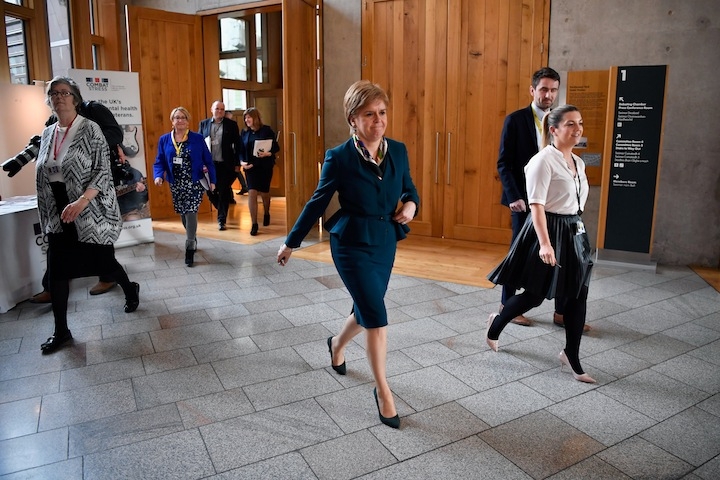Most people are glad to see the end of a referendum campaign, but the losing side always wants to keep going. Nicola Sturgeon has this week demanded a second vote on independence, in defiance of public opinion. And as Brexit talks begin, the country is still divided, with many people wishing to see the negotiations break down and the referendum result be overturned.
The Prime Minister will need to fight these two battles in different ways. In Scotland, she must take care not to fall into the nationalists’ traps. Ms Sturgeon ran for office promising not to call a second referendum unless it was ‘clear’ that a ‘majority of people wanted a referendum’. At the time, the SNP expected support for independence to rise. This didn’t happen; the Brexit vote seems have made Scots even less keen on secession. Sensing that her moment is slipping away, Ms Sturgeon has now called for a new referendum.
The first minister is deploying the usual tricks, trying to dress up an SNP obsession as the will of the nation. Mrs May must not be fooled by her grandiose language, claiming that the ‘Scottish Parliament’ (i.e., her party and a few Greens) has ‘mandated’ her to ‘hold formal talks’ about independence. The architects of the Scottish Parliament made sure it had no such powers, precisely so nationalists could not harass Scots with never-ending votes about independence.
In her visit to Edinburgh, Mrs May repeated that now is not the time for another referendum. She must tread carefully: the SNP, like all nationalists, will always seek more talks — ideally to flounce out of them, declaring a breach of faith. Ms Sturgeon is already saying that it is ‘democratically indefensible’ for her party to be denied its new referendum. But the rules of Britain’s democracy are clear: only the UK government decides whether to hold a referendum. And it must take the full range of Scottish opinion into account.
Public opinion on Brexit remains evenly balanced. About half the nation did not want their Prime Minister to trigger Article 50. Having assured the Brexiteers of her intentions, Mrs May must worry more about those who see, in Brexit, the triumph of ugly nativism or a nostalgic isolationism. Her Lancaster House speech in January laid out a compelling, globally minded vision of Brexit. Emphasising that message will be key to addressing the worst fears of Remain voters.
The triggering of Article 50 represents a great opportunity. We can now move on from whether Britain should or should not leave the EU: Article 50 has served irrevocable notice of our doing so. We can also move on from what Brexit means, as the Prime Minister has made her objectives clear: no to the single market, to free movement of people and to the European Court of Justice. So a new discussion can now begin. Given that Britain will make a clean break from the EU, what kind of nation do we want to be? And how engaged do we wish to be with our allies?
This is Mrs May’s chance to confound her critics and strengthen Britain’s Union. She is accused of succumbing to a demented wing of her own party, of riding a populist tiger and pushing the British economy towards the edge of a cliff with her general intransigence. The SNP accuses her of wanting to be queen of a Little England. She has answered those critics in speeches. Now she needs to do so with policy.
As James Forsyth argues on p. 12, May needs to act to back up her words. Britain must champion free trade at a time of rising protectionism, and should do far more to help our European neighbours tackle people smuggling and the refugee crisis. This is necessary not just in order to get something in return, but to make it clear to Europe and the world what type of nation Britain will be after Brexit — to rise above the horse-trading of Brussels, and act on principle.
Such gestures will be expensive: so be it. Britain has a reputation to defend. There is no shortage of critics around the world portraying Brexit as the action of a nation turning in on itself. Perhaps the most dramatic thing the Prime Minister could do is to grant assurances to the three million European Union nationals, saying that anyone living here legally before Article 50 was triggered can stay here — regardless of what other EU member states say about British abroad.
Such a move would wrongfoot the SNP, which has been using the plight of the EU nationals as proof of the wickedness of Westminster politicians. And it would signal to the rest of Europe that Britain is approaching the negotiations in a spirit of generosity — with the intention of establishing a new alliance, not just cutting the knot on an old one. Brexit is not about leaving Europe, but about renewing and improving our relationship with Europe. Mrs May will be defined by her battles on Brexit and for the Union. With a combination of strength and generosity, she can win both.






Comments